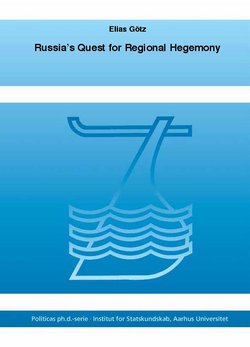Elias Götz
Russia's Quest for Regional Hegemony

What accounts for the patterns of change and continuity in Russian near abroad policy? Why was Russia especially assertive toward other post-Soviet republics in the mid-2000s, but less so in the period before? And why did Russia go to war against Georgia in August 2008? The dissertation seeks to answer these questions by creating a theory of great power behavior that combines insights from offensive realism and neoclassical realism. More specifically, the theory argues that geopolitical pressures and opportunities, in conjunction with varying levels of state capacity, explain why, when, and how great powers seek to control their immediate environment.
The dissertation’s centerpiece is an in-depth analysis of Russian near abroad policy from 1991-2008. Existing studies explain Moscow’s often assertive behavior in the post-Soviet space by domestic-level factors – be it the personality of President Putin, the semi-authoritarian form of governance, or the country’s strategic culture. This study shows that the conventional scholarly wisdom is mistaken. While domestic factors do matter, especially the state’s administrative and extractive capacities, the ultimate driver of Russian near abroad policy is located at the systemic level.
The dissertation will be of interest to scholars of international relations theory, great power politics, and Russian foreign policy.
Kan ikke downloades
![]() Ophavsretten tilhører Politica. Materialet må ikke bruges eller distribueres i kommercielt øjemed.
Ophavsretten tilhører Politica. Materialet må ikke bruges eller distribueres i kommercielt øjemed.